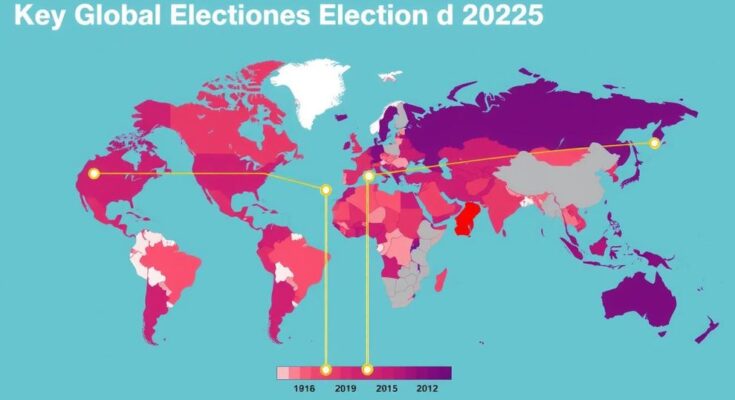In 2025, significant elections in Belarus, Germany, the Philippines, Canada, and Chile will address crucial socio-political issues amid ongoing global challenges. Expert insights indicate potential implications for governance and international relations. Key points include Belarus’ repressive regime, Germany’s economic challenges, the Philippines’ political dynamics, Canada’s contentious election atmosphere, and Chile’s uncertain political future.
In 2025, significant elections will unfold in several countries, including Belarus, Germany, the Philippines, Canada, and Chile. These elections come against a backdrop of global issues, including economic challenges and political unrest, which remain pertinent in these nations. Experts from various domains have provided insights into the implications of these elections, particularly how they may influence domestic governance and international relations.
In Belarus, President Alexander Lukashenko seeks a seventh term in a deeply repressive environment, where genuine opposition is virtually nonexistent. The elections scheduled for January 26, 2025, will likely reinforce Lukashenko’s authoritarian grip, as conditions for free and fair participation are absent. The potential consequences of his victory include continued alignment with Russia amid ongoing geopolitical tensions, including the war in Ukraine.
Germany’s snap election on February 23, 2025, results from a collapsing coalition government led by Chancellor Olaf Scholz, who is facing a significant challenge due to poor approval ratings and economic stagnation. In a complex political landscape, the outcome may result in a new leadership under Friedrich Merz of the Christian Democratic Union, amid critical considerations related to immigration, economic policy, and Germany’s position in global affairs.
The Philippines will hold its midterm elections on May 12, 2025, which will serve as a referendum on President Ferdinand Marcos Jr.’s administration. With a significant focus on the Senate races, these elections will highlight the dynamics between Marcos Jr. and Vice President Sara Duterte, particularly regarding power consolidation and the potential impeachment challenges she may face.
Canada is anticipated to have an early federal election before October 20, 2025, primarily driven by Prime Minister Justin Trudeau’s declining popularity and potential coalition instability. This election will reflect broader themes of leftist versus conservative populism, specifically addressing economic concerns surrounding inflation and climate policies. Polling suggests a growing faction rallying around Conservative leader Pierre Poilievre.
Chile will conduct its presidential election on November 16, 2025, with a runoff likely in December. The outcome is uncertain as incumbent President Gabriel Boric is unable to seek reelection, and challenges remain within his left-wing coalition amid rising crime rates and fluctuating foreign investments. An opposition victory could signify a shift toward conservative governance, yet the current political dynamic remains fluid and unpredictable.
As 2025 approaches, these elections encapsulate the fluctuating political landscape and societal tensions facing these nations, marking critical junctures that may redefine their future trajectories.
The article presents an overview of five significant elections scheduled for 2025 across various nations, emphasizing the underlying themes influencing each electoral environment. Each country’s political backdrop is distinct yet interconnected through broader global issues, such as inflation and the rise of populist ideologies, which are reshaping governance and public sentiment worldwide. By consulting experts in each respective nation, the article delineates what is at stake in these elections, reflecting a mixture of local challenges and global ramifications that merit close attention from observers and analysts alike.
In conclusion, the elections poised to take place in Belarus, Germany, the Philippines, Canada, and Chile in 2025 are set against a complex tapestry of domestic and international challenges. Analysts underscore the critical nature of these elections, as they could significantly influence governance, political stability, and international relations in a rapidly changing world. The outcomes of these elections may not only affect the countries involved but also resonate on a global scale, requiring stakeholders to anticipate and analyze the potential repercussions carefully. The scrutiny these elections will receive is essential, as they illuminate broader trends in populism, governance, and global political dynamics that will shape future discourse and policy.
Original Source: www.ndtv.com




